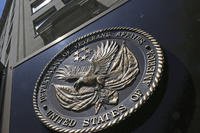MANNING, S.C. — In the aftermath of record rainfall levels throughout South Carolina, communities are faced with damaged roads, loss of power and an inability to obtain their basic needs such as clean water, food and medical attention.
For this reason, the South Carolina National Guard is working with civilian authorities conducting health and welfare checks to ensure community members receive the help they need.
As of this morning, more than 2,650 Guard members were on duty in the hard-hit state, according to figures at the National Guard Bureau in Arlington, Virginia. The death toll in North and South Carolina was at least 19, according to the Associated Press.
Providing Food, Water
One such community receiving National Guard attention is Clarendon County where National Guard soldiers are working around the clock bringing food and water to the community members, as well as providing transportation when needed where areas are flooded.
"They were able to transport a doctor into the Olanta area, a small community in Clarendon County, where she was one of the only health professionals in that area," said Army Maj. Michael Barrett, the 218th Maneuver Enhancement Brigade's liaison officer for Clarendon County. "We had a Humvee transport her through some areas that were flooded so that she could provide medical care for anyone who needed it."
Barrett explained that South Carolina National Guard units have been working in the county since Oct. 3, supporting the local civilians by conducting these sustainment and recovery operations. They have supported multiple agencies during this time including Urban Search and Rescue from Fairfax County, Virginia, the Federal Emergency Management Agency, and various levels of county authorities.
Helping Spanish Speaking Residents
However, some community residents are Spanish speaking and do not understand the message being communicated when a person in uniform offers help. This is where Army Spc. Antonino Bautista, 1st Battalion, 178th Field Artillery Regiment Charlie Battery, has stepped up.
"We have a soldier that speaks fluent Spanish and he's from the local area," Barrett said. "He goes out with the teams, talks with the civilians and communicates the message to them … so that they don't feel excluded or abandoned from the local county or state."
Bautista said that he believes it brings the community members comfort that he can talk to them in Spanish and assure them that the National Guard is there to help. He has lived in the area for about 10 years, so he is part of the community and is willing to do his part.
"I went out there and translated. I asked them what they needed and some people needed help," Bautista said. "This is what I signed up for — to help people."





























